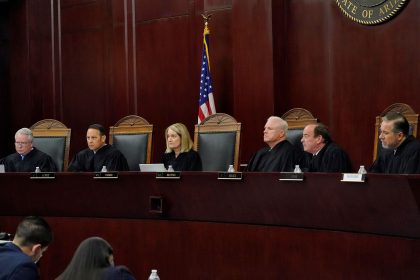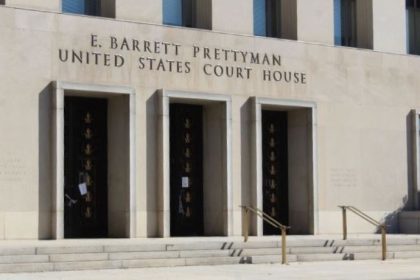‘The Other Side of Me,’ How One Woman’s Redemption Offers Hope to Countless Others
Part IV: Peace With Honor

Opioids have overwhelmed rural Illinois. Desperate, the cops in Ronald Reagan’s hometown have stopped arresting people and started getting them help. In an exclusive series, The Well News looks at “Safe Passage,” a program that radically rethinks America’s War on Drugs. Read Part I: The Town That Raised Reagan Wants Out of the War on Drugs, Part II: A Failed State, How Illinois’ Opioid Crisis Collided With a Political Crisis, and Part III: Doctor Zero, How a Single Doctor Became His Own Opioid Crisis.
Dixon, Ill. — After two decades of the opioid crisis, small towns like this one are barely breathing. If they’re going to survive, they’re going to have to rely on people who’ve taken their own journeys through the underworld.
Here, in a cramped conference room at Dixon’s police headquarters, Det. Jeff Ragan introduces me to a woman we’ve agreed to call Melindia. She is a newly hired rehab coach for Safe Passage, one of the people who will help recovering addicts on their hellish journey back to the land of the living.
Melindia grew up on a farm outside of Dixon. When she was nine, her mom went out to help her dad milk the cows. They seemed to be taking a while, so Melindia went to check on her mother. She found her mom bloodied, crawling out of the cows’ watering trough. Her father, confronted over one of his affairs, had beaten her, dumped her in the water and dropped an electrical cord in the trough, hoping to electrocute her. Melindia ran back into the house, wordlessly warned her older brother and sister, and then spent the rest of the morning hiding while their father stalked around the house, looking for them, “until he had to go work.”
Her father had been violent before and Melindia suspects he suffered from undiagnosed bipolar disorder. (She herself was diagnosed with it a few years ago.) Her mother recovered, packed the kids in a van, took them to an aunt’s house and called the police. But her father had a relative in the department and it was suggested — in that way that small-town cops sometimes do — that an arrest wouldn’t help anyone. “My mom had to run from everybody,” Melindia says.
Her parents eventually divorced, but her father was awarded visitation, which kept up until the night he crept into Melindia’s room and held a knife to her throat while she lay in her bunk bed. “I begged him, ‘Please don’t. I want to leave. I want my mom,’” Melindia recalls. Melindia’s mom never filed any paperwork about the incident — why make a fuss? — but the kids stopped going to their father’s home.
‘I Was Not Done’
“When you’re nine and stuff like that happens,” Melindia says, “you don’t deal with it. You just go on with your best life.”
Always bright and skilled at reading people, Melindia hung out with the older kids. When she was 12, she dated a guy called Chris, who was 16. Chris often drove to Rockford — an old industrial city about an hour to the northeast — where the heroin was cheap and plentiful. Pretty soon, Melindia was making trips to Rockford, too, and shooting up in the car on the way home. “I was on heroin before I had even tried pot,” she says.
She didn’t get help until she was 19, when she was arrested again for breaking into her mom’s house looking for stuff to steal. Her mother insisted that she be charged with a felony. Melindia was diverted to drug court and eventually became a recovery consultant at the nearby mental health clinic and in the Lee County Courts, helping other addicts.
Melindia was clean for seven years. Then something went wrong with her bipolar medications and she found herself struggling to get things right. Her relationship with her boyfriend went south. She put in her two weeks’ notice at the mental health clinic and soon was sucking down Suboxone lozenges. When that didn’t get her the high she needed, she went back to heroin. Within a few months, she was living out of her car again.
Ragan, she says, saw what was happening and reached out. “I just knew I was not done with addiction,” Melindia recalls.
‘The Other Side’
While filling up her car at a gas station one day, she saw a man she recognized from high school. “I didn’t even know you were still alive,” he told her. He asked Melindia to help him get some Sudafed, one of the ingredients for methamphetamine. Melindia has spent most of her life “hustling” and she was good at procuring the supplies her friend needed. The friend told her he could help her quit heroin.
“Which I did,” she recalls, “and went straight on to meth.”
She cooked meth for a couple of months until one night, while she and her friends were headed to the Magnuson Hotel, just on the edge of Dixon, local cops surrounded them. Their meth business had attracted the attention of the local drug task force, Ragan says, and had been followed for weeks.
Melindia wasn’t “holding,” so she assumed that she would be released. Several of her cop friends, Ragan included, kept trying to talk to her about her drug problem while she waited in the police station. She rebuffed them all. A while later, the cops came back to tell her she was being charged with a Class X felony, Illinois’ second most serious category of offense, behind murder. “I just put my head down on the table,” Melindia recalls. “I hadn’t slept in, like, two weeks.”
She’s now out on bail but faces 30 years in prison.
The local cops still didn’t give up on her. They bought her plane ticket to Florida, where she rehabbed for a while (“It was the most beautiful place I’d ever seen,” she says). Another former addict gave her one of her old jobs at a local diner. Melindia is now clean and sober. She hasn’t been promised anything for helping with Safe Passage, and she admits she’s frightened about the case hanging over her head.
But she at least has a chance at recovery. “All of these guys,” she says, gesturing toward Ragan with her sweatshirt sleeves pulled all the way to her fingernails, her right hand shaking, “I’m lucky that they know the other side of me.”
—
Part I: The Town That Raised Reagan Wants Out of the War On Drugs
Part II: A Failed State, How Illinois’ Opioid Crisis Collided With a Political Crisis
Part III: Doctor Zero, How A Single Doctor Became His Own Opioid Crisis
—
Bill Myers lives and works in Washington, D.C. Email him at [email protected]. He tweets from @billcaphill.























